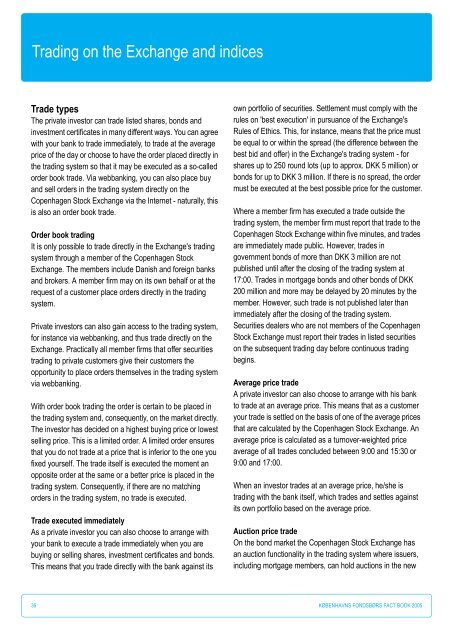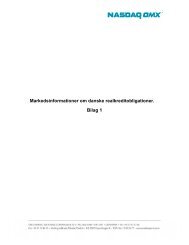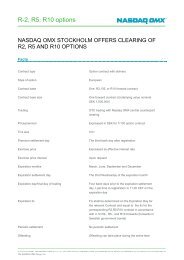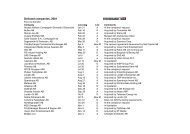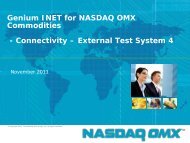Fact Book 2005 - NASDAQ OMX Trader Nordic
Fact Book 2005 - NASDAQ OMX Trader Nordic
Fact Book 2005 - NASDAQ OMX Trader Nordic
Create successful ePaper yourself
Turn your PDF publications into a flip-book with our unique Google optimized e-Paper software.
Trading on the Exchange and indices<br />
Trade types<br />
The private investor can trade listed shares, bonds and<br />
investment certificates in many different ways. You can agree<br />
with your bank to trade immediately, to trade at the average<br />
price of the day or choose to have the order placed directly in<br />
the trading system so that it may be executed as a so-called<br />
order book trade. Via webbanking, you can also place buy<br />
and sell orders in the trading system directly on the<br />
Copenhagen Stock Exchange via the Internet - naturally, this<br />
is also an order book trade.<br />
Order book trading<br />
It is only possible to trade directly in the Exchange's trading<br />
system through a member of the Copenhagen Stock<br />
Exchange. The members include Danish and foreign banks<br />
and brokers. A member firm may on its own behalf or at the<br />
request of a customer place orders directly in the trading<br />
system.<br />
Private investors can also gain access to the trading system,<br />
for instance via webbanking, and thus trade directly on the<br />
Exchange. Practically all member firms that offer securities<br />
trading to private customers give their customers the<br />
opportunity to place orders themselves in the trading system<br />
via webbanking.<br />
With order book trading the order is certain to be placed in<br />
the trading system and, consequently, on the market directly.<br />
The investor has decided on a highest buying price or lowest<br />
selling price. This is a limited order. A limited order ensures<br />
that you do not trade at a price that is inferior to the one you<br />
fixed yourself. The trade itself is executed the moment an<br />
opposite order at the same or a better price is placed in the<br />
trading system. Consequently, if there are no matching<br />
orders in the trading system, no trade is executed.<br />
Trade executed immediately<br />
As a private investor you can also choose to arrange with<br />
your bank to execute a trade immediately when you are<br />
buying or selling shares, investment certificates and bonds.<br />
This means that you trade directly with the bank against its<br />
own portfolio of securities. Settlement must comply with the<br />
rules on 'best execution' in pursuance of the Exchange's<br />
Rules of Ethics. This, for instance, means that the price must<br />
be equal to or within the spread (the difference between the<br />
best bid and offer) in the Exchange's trading system - for<br />
shares up to 250 round lots (up to approx. DKK 5 million) or<br />
bonds for up to DKK 3 million. If there is no spread, the order<br />
must be executed at the best possible price for the customer.<br />
Where a member firm has executed a trade outside the<br />
trading system, the member firm must report that trade to the<br />
Copenhagen Stock Exchange within five minutes, and trades<br />
are immediately made public. However, trades in<br />
government bonds of more than DKK 3 million are not<br />
published until after the closing of the trading system at<br />
17:00. Trades in mortgage bonds and other bonds of DKK<br />
200 million and more may be delayed by 20 minutes by the<br />
member. However, such trade is not published later than<br />
immediately after the closing of the trading system.<br />
Securities dealers who are not members of the Copenhagen<br />
Stock Exchange must report their trades in listed securities<br />
on the subsequent trading day before continuous trading<br />
begins.<br />
Average price trade<br />
A private investor can also choose to arrange with his bank<br />
to trade at an average price. This means that as a customer<br />
your trade is settled on the basis of one of the average prices<br />
that are calculated by the Copenhagen Stock Exchange. An<br />
average price is calculated as a turnover-weighted price<br />
average of all trades concluded between 9:00 and 15:30 or<br />
9:00 and 17:00.<br />
When an investor trades at an average price, he/she is<br />
trading with the bank itself, which trades and settles against<br />
its own portfolio based on the average price.<br />
Auction price trade<br />
On the bond market the Copenhagen Stock Exchange has<br />
an auction functionality in the trading system where issuers,<br />
including mortgage members, can hold auctions in the new<br />
36 KØBENHAVNS FONDSBØRS FACT BOOK <strong>2005</strong>


